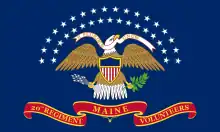Flag of Maine
The flag of the state of Maine features Maine's state coat of arms on a blue field. In the center of the shield, a moose rests under a tall pine tree. A farmer and seaman represent the traditional reliance on agriculture and the sea by the state. The North Star represents the state motto: dirigo ("I Lead").
 | |
| Maine State Flag | |
| Use | Civil and state flag |
|---|---|
| Proportion | 26:33 |
| Adopted | February 23, 1909 |
| Design | A state coat of arms on a blue field. |
| Maine Merchant and Marine Flag | |
 | |
| Use | Ensign |
| Adopted | 1939 |
| Design | Green pine tree with a blue anchor around its base on a white field with "DIRIGO" in blue above the pine tree and "MAINE" in blue below |
The design commonly used omits the circular ring prescribed by Maine Law as a part of the Maine Arms and moves the "Sea and Forest Scene" from the outside of the shield to the inside of the shield. There are no known flags of the State that conform to the official description.
There are no official colors for the coat of arms, so variations in coloration can be seen in flags from different manufacturers. The blue field, however, is specified to be the same blue as in the flag of the United States. According to the official description, the flag should have a fringe of yellow silk and should have a blue and white silk cord attached at the spearhead. These embellishments are very rarely observed.
The law establishing the flag was enacted on February 23, 1909, and was modeled after flags used in the American Civil War:
§206. State flag. The flag to be known as the official flag of the State shall be of blue, of the same color as the blue field in the flag of the United States, and of the following dimensions and designs; to wit, the length or height of the staff to be 9 feet, including brass spearhead and ferrule; the fly of said flag to be 5 feet 6 inches [1.68 m], and to be 4 feet 4 inches [1.32 m] on the staff; in the center of the flag there shall be embroidered in silk on both sides of the flag the coat of arms of the State, in proportionate size; the edges to be trimmed with knotted fringe of yellow silk, 2+1⁄2 inches [64 mm] wide; a cord, with tassels, to be attached to the staff at the spearhead, to be 8 feet 6 inches [2.59 m] long and composed of white and blue silk strands. A flag made in accordance with the description given in this section shall be kept in the office of the Adjutant General as a model.”[1]
Maine is one of 26 U.S. states that use a blue flag with the state arms or seal on them.
The North American Vexillological Association (NAVA) conducted a survey in 2001 that ranked Maine's current flag as one of the worst in design. Amongst the 72 U.S. state, U.S. territorial and Canadian provincial flags, Maine's flag ranked 60th (13th worst).[2] NAVA criticized the unoriginality of "[state] seal on blue bed-sheet" design, which is currently used by over half of the flags of U.S. states.
History
Original flag
.svg.png.webp)
 Former Maine state flag from 1901 to 1909
Former Maine state flag from 1901 to 1909 A modern version of the original flag using the pine from the merchant and marine flag
A modern version of the original flag using the pine from the merchant and marine flag
Originally, the 1901 Maine flag consisted of a green pine tree, a Native America-derived symbol of New England and freedom, in the center, with a blue "North Star", all on a buff-colored background.[3][4]
The Maine legislature approved the current flag of Maine on February 24, 1909.[5]
Ensign

 Digital reproduction of the 1939 Maine merchant and marine flag, produced by Maine Flag Company
Digital reproduction of the 1939 Maine merchant and marine flag, produced by Maine Flag Company
Maine is also one of only two states with a separate ensign, which is rarely seen (the other is Massachusetts). It features symbols from the current flag and the older one, with a white field and green pine tree. The green pine tree has the seaman's anchor, and the words "MAINE" and "DIRIGO" around it.
A photograph of the earliest-known specimen of the Maine merchant and marine flag was featured in a June 1939 International News Photos wire photo.[6][7]
First Militia Flags
.jpg.webp)
 Maine Militia Flag 1822–1861. Drawing by David B. Martucci.
Maine Militia Flag 1822–1861. Drawing by David B. Martucci.
Maine had a semi official state color used by its militia from 1822 to 1861. After separating from Massachusetts in 1820, the Maine Adjutant General Samuel Cony needed to supply flags for Maine's approximately 100 militia companies because one of the articles of separation required Maine to return all militia flags (but it failed to mention poles, which were retained and reused). Casting about for a cost-effective method of producing such quantity of flags, he engaged John R. Penniman of Boston in 1822 to provide a suitable design which was engraved onto a copper plate and then printed onto silk in multi-colors, the first known production of such for flags. A second printing was done in 1827. About a dozen or so portions of these flags still exist, including one at the Maine Historical Society still mounted on its original pole. The last known instance of a Maine militia unit using this flag was in 1861 at the First Battle of Bull Run, which was recorded as being captured by Confederate forces.
Flag of the 20th Maine

 Flag of the 20th Maine Volunteer Infantry Regiment; one of several flags used by the 20th Maine Volunteer Infantry Regiment during the American Civil War.
Flag of the 20th Maine Volunteer Infantry Regiment; one of several flags used by the 20th Maine Volunteer Infantry Regiment during the American Civil War.
Several flags were used by the 20th Maine Volunteer Infantry Regiment during the American Civil War.
Bicentennial Flag of 2020
.svg.png.webp) Maine Bicentennial Flag with off-center tree and lower blue field to give the feeling of looking out from the forest over water.
Maine Bicentennial Flag with off-center tree and lower blue field to give the feeling of looking out from the forest over water.
In 2019, Maine lawmakers introduced a bill to adopt a simpler flag for the state, based on the original 1901 flag.[8] A flag with a buff background, a blue star, and green pine tree from the Merchant and Marine flag, created by the Maine Flag Company, was one of the proposed options. Maine resident Jeff Van West also submitted a design for the new flag. His flag had a white star on a dark blue of a night sky over a lighter blue representing the rivers, ponds, and oceanfront of Maine. He had the tree extend off the flag border to give the feeling of being in the forest looking out over the water.
The measure to change the state flag failed. However, the legislature approved creating a flag for Maine's Bicentennial in 2020.[9] Secretary of State Matt Dunlap submitted three designs for public comment: one of his own design, one using the Maine Bicentennial Committee logo, and a third based on Van West's flag, but replacing the white star with the full-color Dirigo Star from the state flag.[10] After the third design won the contest, Van West offered Dunlap a further revision replacing the colored Dirigo Star with a simplified white one. Dunlap approved that version as the Maine 2020 Bicentennial Flag.[11]
A grass-roots movement to adopt a modernized version of the 1901 flag has since sprung up.[12]
Other flags used
.svg.png.webp) An early flag of the Massachusetts Bay Colony with the St George's cross of England removed. Maine was a part of the Massachusetts Bay Colony.[13]
An early flag of the Massachusetts Bay Colony with the St George's cross of England removed. Maine was a part of the Massachusetts Bay Colony.[13].svg.png.webp) After the union of England and Scotland, some New England ensigns used the British Union Flag rather than the St George's Cross.[14]
After the union of England and Scotland, some New England ensigns used the British Union Flag rather than the St George's Cross.[14].svg.png.webp)
.svg.png.webp) The flag of New England during the Revolutionary War.[16]
The flag of New England during the Revolutionary War.[16] Flag flown during the Dominion of New England using the personal standard of Edmund Andros.
Flag flown during the Dominion of New England using the personal standard of Edmund Andros. Flag of the short lived Republic of Madawaska which was situated between Canada and the US.
Flag of the short lived Republic of Madawaska which was situated between Canada and the US.
See also
References
- "Title 1, §206: State flag". Legislature.maine.gov. Retrieved 24 May 2019.
- "2001 State/Provincial Flag Survey - NAVA.org" (PDF). nava.org.
- "Maine Flags Prior To 1909 (U.S.)". Flags of the World. Retrieved February 10, 2008.
- Shattuck, John W. (pseud. of W. J. Sidis). The Tribes and the States (unpublished manuscript), 1935. Chapter XIX, Section 104b. "It was about this time that the old Massachusetts rebel emblem of the Pine Tree, which was in its turn the emblem of the Penacook tribes, denoting the pine forests of New England and the type of freedom native to them, was put into use in modified form as a symbol of protest against arbitrary authority. The Pine Tree was still the emblem of the Massachusetts rebels, especially of the Okamakammesset followers; while those who indulged in the more centralized forms of protest sponsored by the Sons of Liberty in the colonies as a whole used the device in the modified form of a tall pole―the Pine Tree without its needles. These "liberty poles" played a great part in subsequent demonstrations against the authorities in [North] America, and were later adopted as a rebel emblem in other countries." http://www.mortenbrask.com/wp-content/uploads/The-tribes-and-the-states-SIDIS.pdf
- "Biddeford". biddeford.advantage-preservation.com.
- "Merchant and Marine Flag of Maine (U.S.)". www.crwflags.com.
- "Clipping from The Daily Clintonian". The Daily Clintonian. 28 June 1939. p. 2.
- "HP0508, LD 687, item 1, An Act To Restore the Former State of Maine Flag". www.mainelegislature.org. Retrieved 2020-03-21.
- Writer, Scott ThistleStaff (2019-03-11). "Lawmakers dump vintage flag design, but Maine still may have a new look for its bicentennial". Press Herald. Retrieved 2020-03-21.
- Writer, Edward D. MurphyStaff (2019-05-18). "Maine bicentennial flag modeled on 1901 original tops online survey". Press Herald. Retrieved 2020-03-21.
- WGME (2019-05-24). "Maine's bicentennial flag unveiled". WGME. Retrieved 2020-03-21.
- "Maine State Flag: The Current Version Versus The Original Design & Why Symbols Matter". Maine Public. 2021-03-04.
- David B. Martucci. "The New England Flag". D. Martucci. Archived from the original on April 1, 2007. Retrieved 2008-07-25.
- Historical Flags of Our Ancestors. "Flags of the American Revolution Era". Loeser.is. Retrieved 24 June 2019.
- Historical Flags of Our Ancestors. "Flags of the Early North American Colonies and Explorers". Loeser.is. Retrieved 30 October 2014.
- "New England flags (U.S.)". Crwflags.com. Retrieved 2008-11-07.